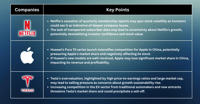The resolution of the US government's debt ceiling negotiations has brought a collective sigh of relief to global markets. The news of the agreement has sparked a rebound in the stock market, with early Asian trading showing a slight dip in the US dollar against other currencies and a decline in the Japanese yen, a traditional safe-haven currency. Meanwhile, US stock index futures have risen, while US Treasury futures have fallen.
Historically, when the US government reaches an agreement on the debt ceiling, the market tends to exhibit a positive trend. However, it is crucial to recognise that the impact of debt ceiling agreements can vary depending on economic conditions and other factors.
Looking back at previous instances, in 2011, the S&P 500 index surged by 11% in the first month following the debt ceiling agreement. Similarly, in 2013, the index rose 5.4% in the first month after the agreement. However, in 2015, the increase was more modest, with the S&P 500 index climbing by only 1.8% in the first month.
The divergence in these outcomes can be attributed to the Federal Reserve's monetary policy at the time. In 2015, the Federal Reserve was in a tightening cycle, while it was in an easing cycle during the previous two instances. Consequently, the debt ceiling agreement led to reduced spending, which had adverse implications during a tightening cycle.
While successful negotiations on the debt ceiling can instil stability and confidence in the stock market, it is crucial to acknowledge that there may also be negative ramifications. With the debt ceiling negotiations resolved, the Treasury Department can issue more bonds to finance government spending. This increase in bond supply can affect market liquidity, leading to a potential decline in bond prices and a rise in yields.
Additionally, a successful debt ceiling resolution necessitates government spending cuts. This can dampen US economic growth and have a detrimental impact on US stocks. The long-term effects of spending reductions may impact company profitability, causing investors to worry about their prospects and subsequently driving down stock prices.
Furthermore, reduced government support for specific industries or companies because of spending cuts can further negatively influence their business operations and profits, subsequently impacting the overall stock market. It is crucial to recognise that decisions made by the US government during debt ceiling negotiations can have far-reaching effects on the economy and financial markets.
Fullerton Markets Research Team
Your Committed Trading Partner














